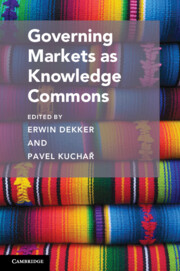Book contents
- Governing Markets as Knowledge Commons
- Cambridge Studies on Governing Knowledge Commons
- Governing Markets as Knowledge Commons
- Copyright page
- Contents
- Contributors
- Preface
- Acknowledgments
- Introduction
- 1 The Contribution Good as the Foundation of the Industrial Revolution
- 2 On the Social Evolution of Knowledge
- 3 Individual Sovereignty and Coproduction of Knowledge Governance
- 4 Common Sense Commons
- 5 Conventions as Shared Cognitive Infrastructures
- 6 Property Rights, Knowledge Commons, and Blockchain Governance
- 7 Knowledge Commons, Social Infrastructures, and Informal Markets
- 8 Entrepreneurship and Governance in the Scotch Whisky Knowledge Commons
- 9 Trolling in the Deep
- 10 Crowdfunding the Queer Museum
- 11 Understanding Different Qualities of the Knowledge Commons in Contemporary Cities
- References
2 - On the Social Evolution of Knowledge
Published online by Cambridge University Press: 09 December 2021
- Governing Markets as Knowledge Commons
- Cambridge Studies on Governing Knowledge Commons
- Governing Markets as Knowledge Commons
- Copyright page
- Contents
- Contributors
- Preface
- Acknowledgments
- Introduction
- 1 The Contribution Good as the Foundation of the Industrial Revolution
- 2 On the Social Evolution of Knowledge
- 3 Individual Sovereignty and Coproduction of Knowledge Governance
- 4 Common Sense Commons
- 5 Conventions as Shared Cognitive Infrastructures
- 6 Property Rights, Knowledge Commons, and Blockchain Governance
- 7 Knowledge Commons, Social Infrastructures, and Informal Markets
- 8 Entrepreneurship and Governance in the Scotch Whisky Knowledge Commons
- 9 Trolling in the Deep
- 10 Crowdfunding the Queer Museum
- 11 Understanding Different Qualities of the Knowledge Commons in Contemporary Cities
- References
Summary
The idea of economic and social progress which emerged in the seventeenth century had as its basis the cumulative growth of knowledge. This included not just codified scientific knowledge but also knowledge which was produced and reproduced in the course of the ordinary business of life and embodied in individual humans, in artefacts and in practices. Although the independent role of knowledge in economic growth always had some recognition, in the period between the late eighteenth and twentieth centuries, it was largely subsumed within the accumulation of capital. While this did reflect the substantial embodiment of knowledge in capital equipment, it also meant that wider considerations of the social and cumulative role of knowledge in productive activity became a minority and heterodox pursuit. The paper seeks to recover the longer historical pedigree of this wider understanding of knowledge including some of its specific characteristics such as its non-rival nature, its incomplete excludability, its tacitness and the uncertainties surrounding innovation.
- Type
- Chapter
- Information
- Governing Markets as Knowledge Commons , pp. 58 - 88Publisher: Cambridge University PressPrint publication year: 2021

